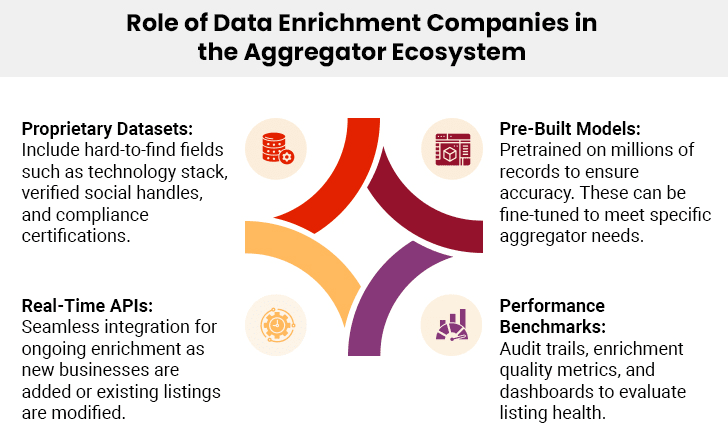Consider the scenario where a restaurant appears on Google Business, Yelp, TripAdvisor, and local directories. Each site displays different hours, phone numbers, and even business names. This is problematic for aggregators serving millions of businesses, as the issue multiplies into billions of potential conflicts, each requiring resolution. The way forward here? AI data enrichment.
Aggregators, whether B2B directories, search engines, or marketplaces, are as valuable as the quality of their business listings. They operate in an environment where accuracy and scalability challenges multiply quickly. Unlike single-source companies, aggregators have to reconcile information from hundreds of sources. The problem isn’t as simple as it seems on the surface. The biggest loophole is the fact that all these sources have diverse formats, quality benchmarks, and update frequencies.
For users seeking trustworthy information or services, outdated or wrong listings often lead to mistrust, friction, and ultimately, customer churn. Incorrect addresses, duplicate entries, missing details, and other data quality issues hamper user experience and searchability. Even worse, quality lapses limit monetization opportunities! We are sure no aggregator business can afford such losses.
Given this scenario, AI data enrichment emerges as the ultimate solution. By automating data validation, deduplication, and enrichment processes, AI technologies offer a scalable solution that traditional, manual methods alone can’t match. These systems use natural language processing, computer vision, predictive analytics, and real-time data pipelines to extract, refine, and continuously update business information. Most impressively, data enrichment is performed with exceptional accuracy. Let’s explore this in detail.
Table of Contents
- What Does Inaccurate Business Listings Impact a Brand?
- What Is AI Data Enrichment?
- How Does AI Data Enrichment Make Business Listings Accurate?
- How to Unlock Scalability with AI-Driven Data Enrichment Services?
- B2B Data Enrichment: How Can Vertical Aggregators Get Ahead?
- What Are the Future Trends in Business Listings for Aggregators?
- Final Thoughts
How Does Inaccurate Business Listings Impact a Brand?
When consumers heavily rely on listing platforms, the presence of outdated or inaccurate information about a service isn’t just a hiccup. These are some real challenges and pose a significant threat for platforms that gather this data. In a nutshell, when the data quality is poor, there is a ripple effect on user engagement, trust, and platform revenue generation. Let’s take a detailed look at the various risks associated with poor quality listings and their repercussions for the business:
1. Loss of Trust and Credibility
When a customer visits a listing platform only to find the wrong or outdated information on the contact details or the office location, they start questioning the credibility of the platform. A single incorrect phone number or outdated directions to reach the location can lead to mistrust. This results in the user losing their interest in the platform and advertiser moving to the competitor.
2. Dynamic Business Profiles
Businesses often change ownership, relocate, rebrand, or shift their product focus. These changes introduce challenges that manual systems can’t handle. Due to the nature of their business, aggregators must track millions of ever-changing business entities in real time; otherwise, they risk providing incorrect information to users.
3. Limitations of Human-Based Data Enhancement
Manual data verification is costly, time-consuming, and susceptible to human error. While it is feasible for a small number of high-value profiles, this approach can’t keep up when businesses need to process millions of listings daily.
The digital economy churns out 402.74 million terabytes of data daily. This massive amount creates new challenges for companies trying to maintain up-to-date business listings manually. These issues highlight the need for a smarter, more efficient way to manage business listings. And that’s where data enrichment powered by AI steps in, not just to correct data but to augment it with minimal human effort.
“Your most unhappy customers are your greatest source of learning.” Bill Gates, Co-Founder, Microsoft
What Is AI Data Enrichment?
AI data enrichment refers to using AI and machine learning tools to enhance and enrich a company’s existing databases. Traditional methods relied on static reference tables and required humans to update the records periodically. Contrarily, AI data enrichment tools dynamically learn patterns, understand context, and resolve entities. What sets this approach apart is the intelligent prioritization of corrections. The key capabilities include:
Natural Language Processing: This capability enables AI data enrichment tools to understand unstructured texts, such as company descriptions, customer feedback, and official documents. Thus, the tools can extract useful information, like business type, service categories, and sentiments about a product.
Computer Vision: This technology matches logo files, facades, and store images with existing brands. Thus, aggregators can easily discover changes in branding or store signs.
Real-Time Entity Matching: This process lines up acquired names, URLs, map points, and business registries with master data. Furthermore, instant entity matching accounts for spelling mistakes, abbreviations, and close matches.
Predictive Classification and Enrichment: This feature estimates missing details, like operational hours and service offerings, using models trained on data from similar businesses.
By embedding AI data enrichment deeply into their pipelines, aggregators can shift from a reactive approach to one continuous improvement. These capabilities form the core of modern enrichment pipelines. But how do they boost data accuracy for aggregators in real-time?
Data Enrichment: Types, Challenges, Steps, and Strategic Value for Businesses
How Does AI Data Enrichment Make Business Listings Accurate?
For aggregators, the ease of identification and accuracy of listings is the most concerning thing as it is the quality and accuracy of data that improves the trust in the platform. For developing and nurturing this trust, ensuring that listings provide accurate facts, have no duplicates, and are verified against reliable sources is non-negotiable.
I. Smart Deduplication with Entity Matching
Duplicate listings are a literal headache for aggregator platforms, as they multiply confusion and compromise customer experience. AI-powered entity matching resolves variations, such as “McDonald’s NYC, 5th Ave” vs. “McDonald’s 5th Avenue, New York.” This is done using probability-based algorithms that consider phonetics, addresses, locations, and other traits. AI systems learn to identify which differences indicate the same business and which are separate entities. This helps maintain the index hygiene.
II. Automated Validation of Structured Fields
Designed for data enrichment, the AI models have the functionality to integrate with Google Maps, digital directories, and domain registries through secure APIs. With these integrations, the existing data related to geocodes, contact numbers, emails, and websites are verified. The AI models flag, fix, and validate discrepancies with high accuracy. This ensures that all relevant data, such as addresses, contact details, email addresses, business hours, URLs of business websites, are accurate.
III. Adding More Information from Third-Party Data Sources
AI enhancements draw from official records, industry databases, review websites, social media, and government APIs. They add context clues such as when a business opened, its license status, financial reports, location, and more to listings. This creates a detailed and more reliable business profile.
IV. Scoring Confidence to Ensure Data Accuracy
Each enriched data field has a confidence score. For instance, a 21% probability that a link is no longer working. This enables platforms to establish thresholds for human review. These scores help clarify workflow priorities, aligning resources with risks and benefits.
These features imply that the AI enrichment ensures listing details are accurate and reliable. This reduces user friction and improves engagement. And although accuracy is crucial, aggregators also need to handle multiple listings. This points us to the next section that explores how AI-powered enrichment helps scale these efforts.
How to Unlock Scalability with AI-Driven Data Enrichment Services?
Aggregators dealing with millions of business listings across geographies and industries can’t compromise on scalability. It’s a must-have for those managing millions of company profiles across regions and verticals. There is no second thought that manual processes aren’t viable at such a large scale. Thanks to AI-driven data enrichment services, such issues can be resolved easily:
i. Automated Enrichment Pipelines at Scale
Data enhancement companies connect with aggregator databases to process millions of entries through APIs or live streaming. They extract key details, verify facts, add information, and classify entries. All this can be done in both batches and real-time with minimal human input.
ii. Continuous Learning Models
The best part about AI systems is that these aren’t static. Or, let’s put it this way, their ability to learn from validation feedback enables them to improve enrichment quality over time. And to do so, AI systems use business closures, new address patterns, and naming conventions among others. What’s more praiseworthy is that these systems can better adapt to real world as data trends evolve, all thanks to their continuous learning ability.
iii. Instant Listing Updates
Another superpower of AI is that aggregators can identify changes in business information. What’s more interesting is that such changes can be detected within minutes rather than weeks. How? Because of the event-driven structure and live API feeds of the AI tools. The outcome? Platforms provide the freshest information, reducing outdated or stale details to negligible levels.
iv. Integration with CRMs and Listing Platforms
Data enrichment providers offer easy-to-use interfaces that connect to CRMs, DMPs, marketplace platforms, and proprietary aggregator systems. These services take care of setup, compliance, and performance scaling, so aggregator teams don’t have to worry about all these activities.
The result is a robust and responsive listing ecosystem that evolves in real time, minimizing downtime and manual work. As AI enrichment becomes mainstream, many aggregators are turning to specialized data enrichment companies to handle complex infrastructure and speed up their time to value.
For aggregators seeking both accuracy and scalability, especially in the B2B context, partnering with a trusted data enrichment company is the right move. Let’s explore how seasoned professionals prove to be useful for B2B businesses that need specific data points to make informed decisions.
B2B Data Enrichment: How Can Vertical Aggregators Get Ahead?
The rules change when it comes to B2B. That’s because these businesses require more specific data to make any decisions. As a result, vertical aggregators collect vertical highly specific data for SaaS directories, industrial marketplaces, supplier networks, and so on. Let’s explore what B2B data enrichment offers:
A. Segment-Specific Enrichment
As the name suggests, these aggregators need details specific to one segment. These include employee count, annual income range, and industry type. Some aggregators also need information on technology and tools used and safety certifications. And this is what AI data systems trained on industry-specific information excel at. These models accurately extract and validate such niche fields.
B. Tailored User Experiences
Tailored user experiences are the key for businesses to carve a unique niche in the industry. Aggregator platforms can craft BFS journeys that feel tailor-made using rich, detailed insights. For example, users can directly ask “Show me health software sellers with 50–200 employees” or “sort by ISO-approved manufacturers in the United States.” Moreover, the better the segmentation, the faster the right connection happens, and the quicker deals get done.
C. Improved Lead Qualification
Another significant benefit of having B2B data is that the aggregator platforms can suggest partner connections as per matching profiles. For instance, pairing a payment-tech startup with a finance-focused marketing company. The result? Better lead conversion and higher customer retention rates.
These benefits highlight the fact that B2B data enrichment becomes a key differentiator for businesses. After all, aggregator platforms are promoted from the role of generic listing providers to high-value decision enablers. As generative AI and real-time capabilities evolve, the future of listing enrichment is becoming increasingly dynamic and autonomous.
Learn How Data Enrichment Fuels Effective ABM Strategies in B2B Marketing
What Are the Future Trends in Business Listings for Aggregators?
AI enrichment is no longer limited to validation. All thanks to new technologies that are helping platforms auto-generate and pre-empt updates. This helps create proactive listings. Let’s take a deeper dive into the trends that are shaping the future of AI-driven data enrichment:
a. AI Agents for Auto?Updating Listings
AI-based monitoring agents can scan regulated websites, news sources, and social platforms for brand announcements. When valid changes occur-like address updates-they can autonomously update listings and trigger notifications to aggregators.
b. LLM?Driven Unstructured Synthesis
Large language models can ingest large, unstructured documents-press releases, news, insurance filings-and distill them into structured attributes such as founding year, leadership team, new capabilities, and awards.
c. Predictive Enrichment via Pattern Detection
By analyzing emerging signals-web traffic surges, recent hiring, domain registrations-AI can predict new business openings or service expansions before they are officially listed. This front?running capability can give aggregators a sourcing advantage.
d. Compliance and Privacy in AI Pipelines
As AI enrichment becomes more autonomous, aggregators must balance capability with compliance. Regulations like GDPR, CCPA, and proposed AI governance frameworks require data minimization, consent, and auditability. Vendors must maintain transparent metadata trail logs, extract data only from permitted sources, and secure user rights to opt out.
Final Thoughts
In the time of digital trust and dynamic business landscapes, aggregators no longer have the luxury of outdated systems. AI data enrichment delivers:
- Accuracy: thanks to entity resolution, validation, and confidence scoring
- Scalability: through automated, continuous pipelines handling millions of data points
- Freshness: via real?time updates, generative capture, and predictive enhancements
- Market focus: particularly valuable in B2B data enrichment contexts, with metadata depth for market segmentation and partner matching
One thing is clear: aggregators must adopt an AI?first mindset in designing listing pipelines. Outsourcing enrichment to specialized platforms while maintaining oversight allows organizations to harness the full power of AI data enrichment at scale. Those who do will exceed user expectations, setting the stage for sustained relevance and competitive advantage.







